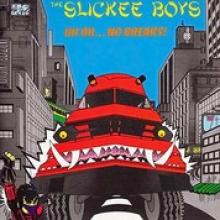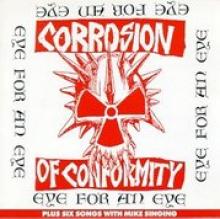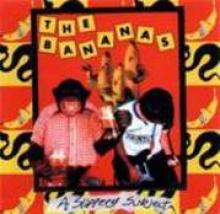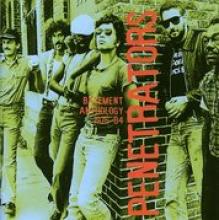Box Elders: Live (Video)
Slickee Boys Get Poppy
Most notorious would have to be Iron Cross, which gave the world “Crucified.” And while that might be the most well known effort from the nation’s capitol, U.S. Chaos and a bit later on, the Suspects churned out a few above board punk releases.
Before any of that, though, the Slickee Boys were working in what must have been a musical wasteland – just like the rest of the country. But because of the group’s determination and persistent release schedule, it was able to help establish a basic framework for ensembles, in its wake, to have a go at independent music.
It can’t be figured that the Slickee Boys (guitarists Marshall Keith and Kim Kane, singer Mark Noone, and percussionist Dan Palenski) actually affected the wider punk culture – that would be left to Ian MacKaye and his cohort. But in the wide ranging work from this early D.C. group, a variety of styles can be heard.
The band’s work wasn’t always the most consistent, but each release that it put out possesses its own charm and importance.
After its first full length, released via Kane’s own imprint, the group issued a disc’s worth of compilation work and in 1985 returned with Uh Oh…No Brakes. Released on Twin/Tone, which is most known for its association with the Replacements, the Slickee Boys offered up a selection of well construed covers and a number of new tracks.
Included amongst the reworked songs was a rendition of Afrika Corps’ “Jailbait Janet.” The earlier D.C. band is well regarded for inclusion a few folks that would go on to found the Slickee Boys as well as Boston’s the Korps. The history lesson notwithstanding, this specific track counts as one of the faster offerings from the 1985 disc. And while it’s clear that the Slickee Boys here feel the power pop thing deep inside its collective soul, “Jailbait Janet” arrives as an old tyme Ramones style track.
Sadly elsewhere, the group gets into trouble with an ‘80s sound creeping into its rock and roll. “Can’t Believe” isn’t shameful, but the track probably wouldn’t be well enough regarded to find inclusion in a band retrospective. The song structure is interesting with a number of instrumental breaks. But all the twirling guitar notes don’t go too far to buoy the Slickee Boys’ latter day importance.
If nothing else, the disc sports a pretty well done cover by Kane. With the guitarist’s hand in every aspect of the band’s business, even if listeners aren’t enamored of the music here, the ensemble deserves a bit of respect for how it functioned. Other D.C. bands are probably thought of first when discussing DIY ethics, but the Slickee Boys helped get the ball rolling.
Corrosion of Conformity: Punk x Metal X Hardcore
Eye for an Eye doesn’t come off as an extension of the tracks represented on that aforementioned No Core released compilation, although there is some overlap – “Indifferent” is included on both. The Black Flag similarities are still there, but in the vocals throughout the disc, listeners should be able to hear some of the metal influence creeping in. Of course, those breakdowns coming left and right should also point to what was to come, but it might all be obscured by Woody Weatherman’s Greg Ginn inspired guitar soloing.
Coming out of a part of the country – North Carolina - that hadn’t really developed its own, individual punk style allowed the band to eventually work out its own spate of influences over the course of its career. On this early recording, though, the band remains somewhat tied to the group’s forbearers.
The interesting aspect of this particular release is that the cd version of Eye for an Eye includes – tacked on to the end – Corrosion of Conformity’s first EP, recorded after the release of its long player, which was simply called Six Songs with Mike Singing. The Mike referenced in the title is Mike Dean who took over vocal duties, while remaining the group’s bassist, after Erik Eyeck departed.. As listeners make it through thrashy faire like “Coexist,” Eyecke’s throaty vocals announce the beginning of the group’s career. And by the time one gets through to those tacked on tracks at the end, it’s clear that there’s some gradual transformation taking place.
The entirety of this work is fast paced and as aggressive as anything from the hardcore scene at the time. And while Metallica and its cohort were working out speed metal concurrently, Corrosion of Conformity are able to render as nasty a spate of tracks as found elsewhere.
“Not for Me,” a part of the supplemental EP, includes the slurred and endless vocals of Dean as the band whirs through a few chords and the drums pound out a prehistoric vehemence that the group wouldn’t again settle upon. Weatherman’s guitar and his soloing have moved on a bit from the overt Black Flag thing to incorporate a bit of ‘80s metal – or is it New Yawk hardcore? Either way the expanded aural workings of the ensemble render the latter tracks ready for inclusion in any cheese-ball horror move from that decade.
The band would continue to develop its sound over the remainder of the decade. And while some fans found the ever-shifting sound of the group problematic, it can also be seen as the reason that Corrosion of Conformity was eventually able to break its music to a wider audience.
Eye for an Eye and Six Songs with Mike Singing might simply be an historic part of the band’s discography at this point. Beyond that, though, it’s a document of the not just the group growing, but the malleability of punk, metal and hardcore.
Classic Compilations: Why are We Here?
Why Are We Here? isn’t really either (alright, it was released via North Carolina’s No Core imprint and included bands from its roster). It’s an artifact from a time when genres still hadn’t been completely codified, even as that was unquestionably on the horizon. Dug up over at the Maximum Rock ‘n Roll headquarters and posted HERE, the 1983 compilation splices together aggressive groups that each work in varying degrees of hardcore and punk.
The only group to go on to bigger and better things is Corrosion of Conformity, but in this appearance, the band probably doesn’t sound the way that most would imagine. Here’s the play by play…
Bloodmobile: These guys veer back and forth between a Black Flag, 7 Seconds and some more poppy, early ‘80s hardcore stuffs. Bloodmobile’s actually pretty entertaining at this late date. There might be a bit of a nascent political slant to a few of these tracks, but at least it’s well intentioned. And even if its songs aren’t necessarily all that complex, the variety of pacings that the group utilizes makes each of its three songs here more than passable even to you HxCx snobs.
Corrosion of Conformity: No, at this early date, Corrosion of Conformity isn’t what it would become when it gained some fame later on its career. There’s a pretty distinct Henry Rollins influence (from his Black Flag days) in those vocals, though. Musically, the band hasn’t as of yet incorporated any sludgy elements into its work. Instead, the tunes come off as something from the DC or NYC axis of early ‘80s hardcore. Some critics might attempt to distinguish the band from either coastal movements, but this is clearly ExCxHxC related even as CoC works in a bit of an original take on the genre.
Stillborn Christians: Clearly politically motivated, Stillborn Christians even contribute a song focusing on the “New Right,” which remains eerily applicable even in 2010. The introductory portion of that track as well as the its breakdown and the group’s second track each include some weird out of tune approach to hardcore. And by the time that the ensemble gets to the slow portion of “Aggression” it becomes clear that the band is as experimental (if one can be in the hardcore genre) as anyone else function in that era. Stillborn Christians aren’t out of step with Texas’ the Big Boys, but come off more muscular, less funky and just weirder (As a side the band’s bassist, Jeb Bishop, went out to play with the Flying Luttenbachers and a spate of jazz groups during the ensuing decades).
No Labels: This group only contributed two tracks, but the second one is the only offering to break the two-minute mark. No Labels, while sporting the best name outta this clutch of groups, is really the least musically adept and interesting. There’s worse hardcore out there and better stuff here, so stick to that.
Box Elders: Another Wave of Garage...
Comprised of Clayton and Jeremiah McIntyre, as well as drummer Dave Goldberg, the Box Elders unloosed a four song single not too long ago that met with only the most positive reviews. Included on that slab was a Red Kross cover sitting – so unassumingly – alongside its three originals. So while that sloppy effort was as rewarding as it was ramshackle, the Box Elders’ Alice and Friends is just as pleasing even if two of the tracks included here were represented on that single.
As a part of the third or fourth re-tread of the garage thing, the Box Elders can’t be said to be the most original of groups even if the numerous stories about the ensembles moniker (anything from a specific kind of bug living inside of that kick drum to various other nonsensical concepts) are all hilarious. The band’s sound falls somewhere between dulcet garage tones and a sort of ska influenced mod-pop.
Now considering the fact that ska is akin to cussin’ out your mother, that description needs explaining. On both “Talk Amongst Yourself” and “Isabella” the guitar seems to be accenting the one and the three. It’s not an unheard of rock trope, but the approach is more frequently found in JA ska circa 1963. And what’s more is the fact that both of those efforts are amongst the most entertaining offerings here.
“Talk Amongst Yourself” comes off a bit more aggressive, although the latter ska related track maintains the same tempo. Lyrically, neither of those songs present anything all that interesting – and no, garage stuff isn’t generally known for flowery writing – but luckily what the Box Elders give listeners musically is more than enough for the ensemble to remain a vital force in this latest wave of garage acts.
As interesting as any other facet of this Nebraska act is the fact that Goldberg, while bashing drums and cymbals is also, somehow, able to get in a few stabs on the keyboard. If not for this basic addition to the Box Elders’ sound, the group would present a lesser music. They’re no hacks, but the brief and sporadic inclusion of those organ blasts adds not just another dash of ‘60s nostalgia, but an aural break from all the guitar.
On “Atlantis,” which comes about half way through the album, a solo crops up amidst the group vocals that buoy the track in a way that isn’t found elsewhere. Of course, the chorus about falling off into the see isn’t too shabby either, but with just about forty seconds left in the track Goldberg shoots out a few bars of bouncy soloing that removes the track for its adequate status to something more digestible and even remarkable – even if its just for a brief moment.
The Bananas: Punk A-Peel
Regardless, at this point pretty much no one proclaims themselves a pop punk band, which is really a damnable shame. The best punk should have some pop bent to it seeing as that the more thrashy variety isn’t really palatable to most folks. Even with that, though, having fans isn’t the point – making good music is. And Sacramento’s the Bananas do just that, for the most part.
Since the late ‘90s the California band has released a slew of small run singles and even a few full lengths from the inland nation that is Sacto. Working with Plan-It X for the majority of its long players – and most recently with Recess Records – hasn’t gifted the Bananas with too much of a shot at wide spread acclaim. But considering the fact that the ensemble doesn’t too frequently make it outta Cali to tour has something to do with that.
So, while most likely no one reading this isn’t going to get a chance to see the band live, the Bananas’ albums – which are mostly available for less than ten bucks apiece – should give listeners pretty much what they want out of a cut rate rock band (that’s meant in the most positive terms).
The song writing across the group’s four albums is pretty much consistent, although, after making it through the group’s discography it’s easy to hear how the Bananas have grown. That being said the ensemble’s third album – Nautical Rock ‘n Roll – is a bit too slick when compared with the its previous efforts. There’s nothing embarrassing there, but A Slippery Subject – and yes that’s a banana joke - needs to be thought of as the band’s perfected approach to punk and pop.
The loose playing that pervades each of the group’s albums is still well represented on A Slippery Subject even as the song writing and musical performances seem to have reached a point of perfection. The lone complaint that listeners might levy upon this – or any – effort from the Bananas camp is the fact that each song is basically of a uniform construction. That means that there just aren’t too many surprises that crop up across the duration of the album. But even latter album entries like “Mercenary” possess enough of a melodic pitch and well construed vocal harmonies (that term is applied loosely here) as to make it decent way to move towards the close of a recording.
Really, though, there’re highlights all over the place here – “Rebecca” and “Me and My Shadow” perhaps being the most repeatable and singable. A Slippery Subject just doesn’t have a downer moment on it making the disc ideal for those long summer road trips when speeding down the freeway doesn’t pose too much a problem – or hibernating in the winter when it’s too cold to do anything other than wait for a break in the weather.
The Penetrators - Don't You Tell Me...
The guy to the left of frame seems to just be passing through, but what about the jovial looking chap with the hat on, smiling and looking off to the left? The uncertainty that the cover image purports is really indicative of the entire album. In this day of unearthed classics and the like, discs like the Penetrators’ are gonna be snatched up pretty immediately. Of course, if that were to happen to you here, you’d be one sorry record collector.
Released on San Diego’s Swami Records, Basement Anthology (1976-1984) is ostensibly a collection of tracks that really never needed to be recorded in the first place. And while that seems harsh, when a highlight of any recording has a title like “Teenage Lifestyle,” listeners should be heftily warned.
Apart from the all too apparent clunker are the sporadically included live tracks. One of the more egregious inclusions here is “The Scandalizer.” The ensemble, while most likely having a pretty good time, turns in a tune that comes off as a cut rate bar band. Considering the time period that this was all set down – and what else was happening in the underground music scene – there could easily be a number of other groups featured on such a release – the one’s that deserve it, you know?
With all of the refuse spread out over the albums eight teen tracks, there’s sure to be a few to any listener’s liking. And there are. “Shopping Bag,” despite the fact that the song sounds as if it’s all going to come crashing down around you, retains a decent sense of melody and sports one of the most remarkable choruses on the album.
Unfortunately, since the compilation covers such a long period of time, listeners are punished by hearing the Penetrators musically develop over its expanses. Early period tracks arrive with the group just sounding like an inept garage act. By later in the game, though, it’s all ‘80s pop and rock.
“I Call That Love Too” grants listeners a sappy love song with enough rhythmically incompetent lead guitar as to turn anyone off immediately. It’s too bad that the vocals, crooned chorus and ohhhhs that litter the rest of the song take the effort to an even darker and more terrifying place.
It’d be good to figure that the lesser moments here are mitigated by the sparse highlights. But really, there’s just too much nonsense to get through to enjoy this disc at all. So, despite the disc looking as if it might hold some long lost gem, the slab’ll probably be put to good use as a bookmark – but only if you don’t particularly care for the tome that you’re currently reading.
Theoretical Girls are Boys...Mostly
After the first crop of punk acts either got signed and stunk or just moved on to other (and perhaps better) endeavors, a crop of its enthusiasts took up the mantle of neigh sayers. Codification was and will remain rampant in any scene and eventually even post-punk, new wave and no wave would be nothing other than a genre tag used to push records on an unsuspecting public no matter how far removed from the original recording dates. That being said, Theoretical Girls represent what attracted most to a punk or weirdo scenes in the first place.
Comprising guitarist Glenn Branca, drummer Wharton Tiers, Jeffrey Lohn on vocals and guitar in addition to keyboardist Margaret DeWys, the band was able to create an extraordinarily music that retained not just the aggression and simplicity of punk, but also the experimentation of jazz.
In mentioning Theoretical Girls, some note on minimal composers is always made. And while that influence was no doubt in each player’s mind while putting together their music, it’s not always plainly evident in the music.
Acute Records first release is a self titled collection from this New York band that includes the scant studio work the quartet did in addition to what sounds like a clutch of live stuffs and perhaps even some demo work.
What’s most interesting about this group when compared to its cohort is the fact that Theoretical Girls didn’t maintain a singular approach to its music. James Chance and the Contortions went in on some funk classics while other acts represented on the Brian Eno produced No New York compilation engendered noise. The Girls, though, move effortlessly between any and all of these concepts including a bit of almost straight punk.
Sonic Youth must have been fans of this, but on the first rendition of “Theoretical Girls” (yes it was the name of the band, a song and this album), the band repeats an endlessly pleasing punk progression with Lohn counting to four over and over again. The song doesn’t go anywhere, but the pacing and the overall jarring effect was nothing less than punk. The tracks second rendition finds the Girls almost in power pop territory. And while a bunch of the other tracks included here have some sort of interesting story behind it, “US Millie,” which was half of the band’s only properly released single, comes off as a lost Krautrock classic.
So while most folks don’t think of the minimalism of Cluster as punk, Theoretical Girls did. And just for that, Branca and company deserve to be enshrined next to the Ramones and the Clash.






